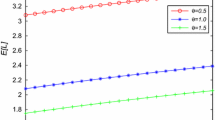Abstract
Distributions with a heavy tail are difficult to estimate. If the design of an optimal scheduling policy is sensitive to the details of heavy tail distributions of the service times, an approximately optimal solution is difficult to obtain. This paper shows that the mean optimal scheduling of an M/G/1 queue with heavy tailed service times does not present this difficulty and that an approximately optimal strategy can be derived by truncating the distributions.
Similar content being viewed by others
Notes
If \(X\) denotes the service time, then the distribution satisfies NBUE if \(E(X)>E[X-s\mid X>s]\) for any \(s>0\).
Using arguments similar to those in [5] it is easy to show that this result would not hold for non-preemptive policies (where preemption is only allowed when a high-priority job arrives).
References
Aalto, S., Ayesta, U.: Mean delay analysis of multi level processor sharing disciplines. In: INFOCOM 2006. Proceedings 25th IEEE International Conference on Computer Communications, pp. 1–11. IEEE (2006)
Aalto, S., Ayesta, U.: Optimal scheduling of jobs with a DHR tail in the M/G/1 queue. In: Proceedings of the 3rd International Conference on Performance Evaluation Methodologies and Tools (p. 50). ICST (Institute for Computer Sciences, Social-Informatics and Telecommunications Engineering) (2008)
Aalto, S., Ayesta, U., Righter, R.: On the Gittins index in the M/G/1 queue. Queueing Syst. 63(1–4), 437–458 (2009)
Aalto, S., Ayesta, U., Righter, R.: Properties of the Gittins index with application to optimal scheduling. Probab. Eng. Inf. Sci. 25(03), 269–288 (2011)
Anantharam, V.: Scheduling strategies and long-range dependence. Queueing Syst. 33, 73–89 (1999)
Borst, S.C., Boxma, O.J., Nez-Queija, R., Zwart, A.P.: The impact of the service discipline on delay asymptotics. Perform. Eval. 54(2), 175–206 (2003)
Boxma, O., Zwart, B.: Tails in scheduling. ACM SIGMETRICS Perform. Eval. Rev. 34(4), 13–20 (2007)
Gittins, J., Glazebrook, K., Weber, R.: Multi-armed Bandit Allocation Indices. Wiley, New York (1989)
Klimov, G.P.: Time-sharing service systems. I. Theory Prob. Appl. 19(3), 532–551 (1975)
Klimov, G.P.: Time-sharing service systems. II. Theory Prob. Appl. 23(2), 314–321 (1979)
Nuyens, M., Wierman, A., Zwart, B.: Preventing large sojourn times using SMART scheduling. Oper. Res. 56(1), 88–101 (2008)
Nuyens, M., Zwart, B.: A large-deviations analysis of the GI/GI/1 SRPT queue. Queueing Syst. 54(2), 85–97 (2006)
Righter, R., Shanthikumar, J.G.: Scheduling multiclass single server queueing systems to stochastically maximize the number of successful departures. Probab. Eng. Inf. Sci. 3(03), 323–333 (1989)
Righter, R., Shanthikumar, J.G., Yamazaki, G.: On extremal service disciplines in single-stage queueing systems. J. Appl. Probab. 27, 409–416 (1990)
Righter, R., Shanthikumar, J.G.: Extremal properties of the FIFO discipline in queueing networks. J. Appl. Probab. 29, 967–978 (1992)
Schrage, L.: A proof of the optimality of the shortest remaining processing time discipline. Oper. Res. 16(3), 687–690 (1968)
Stolyar, A.L., Ramanan, K.: Largest weighted delay first scheduling: large deviations and optimality. Ann. Appl. Probab. 11, 1–48 (2001)
Whitt, W.: The impact of a heavy-tailed service-time distribution upon the M/GI/s waiting-time distribution. Queueing Syst. 36, 71–87 (2000)
Wierman, A., Harchol-Balter, M., Osogami, T.: Nearly insensitive bounds on SMART scheduling. ACM SIGMETRICS Perform. Eval. Rev. 33(1), 205–216 (2005)
Wierman, A., Zwart, B.: Is tail-optimal scheduling possible? Oper. Res. 60(5), 1249–1257 (2012)
Acknowledgments
This work is supported by MURI Grant BAA 07-036.18
Author information
Authors and Affiliations
Corresponding author
Rights and permissions
About this article
Cite this article
Kamble, V., Walrand, J. Approximately optimal scheduling of an M/G/1 queue with heavy tails. Queueing Syst 80, 261–271 (2015). https://doi.org/10.1007/s11134-015-9435-0
Received:
Revised:
Published:
Issue Date:
DOI: https://doi.org/10.1007/s11134-015-9435-0




